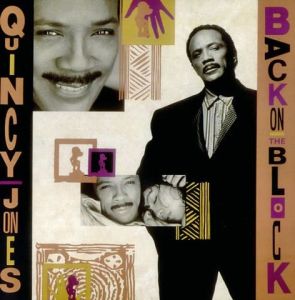I found it in a used CD bin at a record store at the mall. I thought I would take a chance since the price was right.
It was the summer of 1990. This was the first album I ever bought that had rap music on it. Not a lot…but it does start out with rap.
Quincy Jones states early on: “I believe rap is here to stay.”
Hard to believe there was a time that was a bold statement.
This CD boasts the best of the best in what might be called “black” music. Check out this line-up: Dizzy Gillespie, Ray Charles, Tevin Campbell, Ella Fitzgerald, Sarah Vaughan, Ice T, Big Daddy Kane, Kool Moe Dee, Siedah Garrett, Chaka Kahn, James Ingram, Syreeta Wright, Al Jarreau, Bobby McFerrin, Take 6, James Moody, Miles Davis, George Benson, Barry White, and Sheila E…just to name SOME of them.
Quincy, in his liner notes, describes it best. He begins by saying this is the album he has wanted to make for 40 years:
I’ve assembled a group of friends, both old and new, whose musical talents I consider to be God-given, and we’ve worked together to bridge generations and traverse musical boundaries. Let me express it another way: these colleagues and I have taken a journey through every influence and everyone that I love in music. We range in age and talents, from Dizzy Gillespie, Ray Charles (whom I’ve known since I was 14) down to 12 year old singer Tevin Campbell (whom I’ve just met this year)…Together with our friendship, we share the traditions of the African griot storyteller which are continued today by the rappers; the sensuous harmonies with Brazilian music; the Bebop with a dash of Hip Hop; the power of the Gospel choir; the lush vocals of Zulu chant; a taste of jazz, an acapella celebration — each and all evoking tears and laughter.
I fell in love immediately with many parts of this album. Over the years, I’ve grown to love every inch of it. When I share it with students — none of which have ever heard it — they fall in love with aspects of it as well. They may not like it all — it truly has a wide range — but usually they can key in to certain parts.
This is part of my ordinary life in this way: I have always been a lover of music. I have been present every time the music changed. But in 1991 the music would change in such a way that it no longer reached me. Quincy’s album spoke to the part of me that loved the traditions found in music. And no doubt, many of those traditions were present in the music of the 1990’s. But it has become increasingly clear to me how much I missed when I shut out many forms of music in the 90’s. I listened to lots of light jazz like Diana Krall, lots of old favorites, and even Broadway musicals. My younger friends talk about music from the era I have no connection with whatsoever. And I play Song Pop and believe me, the playlists from the 1990’s give me fits.
Quincy’s album has staying power. We are blessed that he did pull this together when he did. I think close to ten of the people listed above are no longer with us.
Back on the Block is a musical tribute to many things. For me, it marks the time when the music changed for a while, leaving me behind. I can see now, it truly was a bit of a dry spell.
But when I listen to Back on the Block, I know that in my heart I never really left. I was just, like everyone else, trying to find my way in a world full of music.

